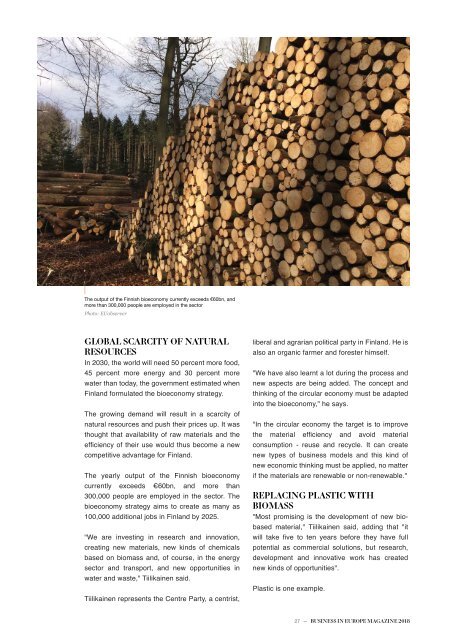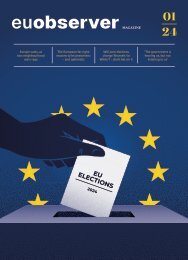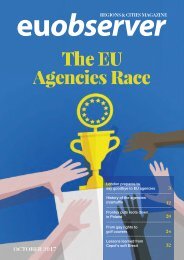Europe's Bioeconomy: The Business of Nature
EUobserver's 2018 Business in Europe magazine takes a closer look at Europe's bioeconomy and how "the business of nature" is changing the way people look at waste and natural resources.
EUobserver's 2018 Business in Europe magazine takes a closer look at Europe's bioeconomy and how "the business of nature" is changing the way people look at waste and natural resources.
Create successful ePaper yourself
Turn your PDF publications into a flip-book with our unique Google optimized e-Paper software.
GLOBAL SCARCITY OF NATURAL<br />
RESOURCES<br />
In 2030, the world will need 50 percent more food,<br />
45 percent more energy and 30 percent more<br />
water than today, the government estimated when<br />
Finland formulated the bioeconomy strategy.<br />
<strong>The</strong> growing demand will result in a scarcity <strong>of</strong><br />
natural resources and push their prices up. It was<br />
thought that availability <strong>of</strong> raw materials and the<br />
<br />
competitive advantage for Finland.<br />
<strong>The</strong> yearly output <strong>of</strong> the Finnish bioeconomy<br />
currently exceeds €60bn, and more than<br />
300,000 people are employed in the sector. <strong>The</strong><br />
bioeconomy strategy aims to create as many as<br />
100,000 additional jobs in Finland by 2025.<br />
"We are investing in research and innovation,<br />
creating new materials, new kinds <strong>of</strong> chemicals<br />
based on biomass and, <strong>of</strong> course, in the energy<br />
sector and transport, and new opportunities in<br />
water and waste," Tiilikainen said.<br />
Tiilikainen represents the Centre Party, a centrist,<br />
liberal and agrarian political party in Finland. He is<br />
also an organic farmer and forester himself.<br />
"We have also learnt a lot during the process and<br />
new aspects are being added. <strong>The</strong> concept and<br />
thinking <strong>of</strong> the circular economy must be adapted<br />
into the bioeconomy," he says.<br />
"In the circular economy the target is to improve<br />
<br />
consumption - reuse and recycle. It can create<br />
new types <strong>of</strong> business models and this kind <strong>of</strong><br />
new economic thinking must be applied, no matter<br />
if the materials are renewable or non-renewable."<br />
REPLACING PLASTIC WITH<br />
BIOMASS<br />
"Most promising is the development <strong>of</strong> new biobased<br />
material," Tiilikainen said, adding that "it<br />
<br />
potential as commercial solutions, but research,<br />
development and innovative work has created<br />
new kinds <strong>of</strong> opportunities".<br />
Plastic is one example.<br />
BUSINESS IN EUROPE MAGAZINE 2018

















